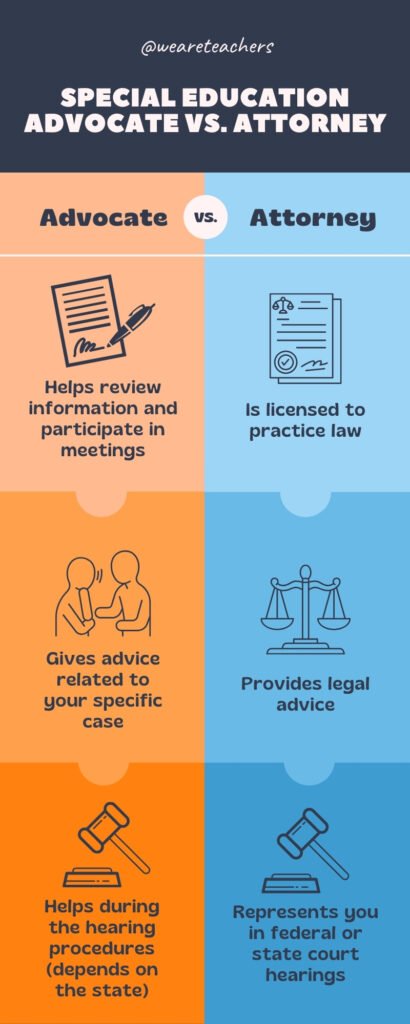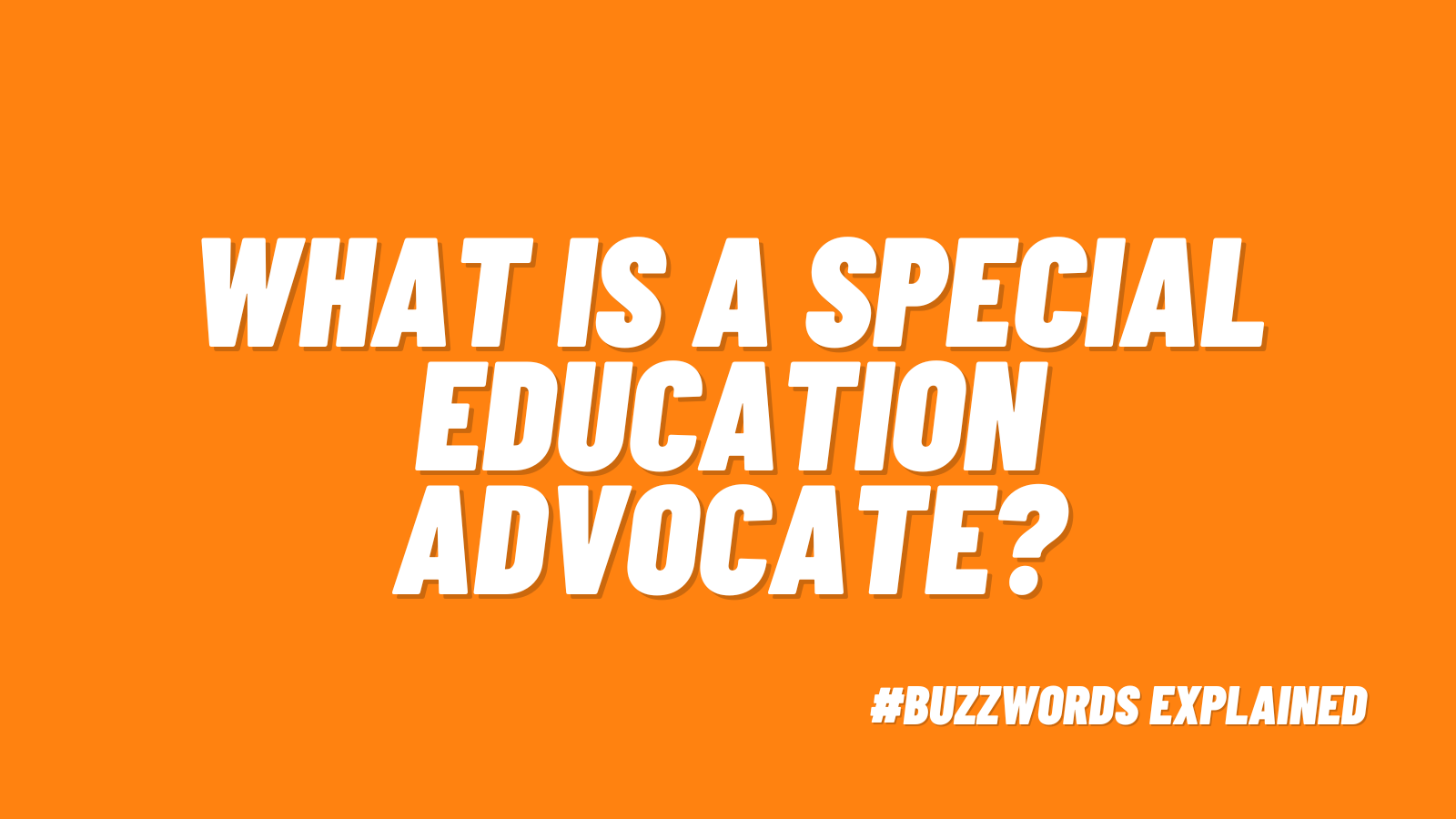When Laura, a parent in Texas, felt like she was out of options for her middle daughter, who required special education services from her school district, she called a special education advocate. The advocate worked with Laura and, through five multiple-hour meetings, Laura and the advocate got her daughter the accommodation she needed. In this case, it was a dedicated space to go when she was having a hard time. Now, Laura’s daughter is thriving, and she gives the advocate credit for helping her get the support she needed.
As parents navigate the special education process, from initial referral to ensuring that the school is implementing the student’s Individual Education Plan (IEP) correctly, a special education advocate can help. So, what is an advocate? When do you need one? And how do you find a good advocate?
Jump to:
What is a special education advocate?
Special education advocates are, well, advocates that parents hire to help them through the special education process. An advocate, says Maria Giancotti, mom and owner of the Student Advocacy Center of Michigan, is there to help represent parents during the special education process, and to educate and empower parents to advocate for their children. Advocates are often parents of children with disabilities themselves or former special education teachers who have additional training in advocacy, mediation, and special education law.
Special education advocates should have knowledge about:
What is the difference between a special education advocate and an attorney?
Both advocates and attorneys support families through the special education process and help navigate disputes. There are important differences, however.
An advocate:
- Helps you review information and participate in meetings
- Gives advice related to your specific case
- Should have special education and advocacy training
- May help during the hearing procedures, depending on the state
- Does not provide legal advice
- Does not have to be licensed or certified
An attorney:
- Is licensed to practice law
- Provides legal advice
- Can represent you if you end up in a hearing in federal or state court

What does a special education advocate do?
When Shannon Peterson, a parent in Minnesota, hired an advocate, she was tired of dealing with the school when it came to her child’s IEP. The advocate helped Peterson understand the evaluations the school sent home and helped identify her child’s diagnosis of dyslexia. It was also helpful to have someone that felt like an ally. “We’re still fighting,” says Peterson, but the advocate is “in our corner.”
For parents, advocates can provide everything from information about federal and state laws, help reviewing a child’s file, and help during meetings.
Advocates can:
- Dissect evaluations or parts of evaluations
- Explain terminology and clarify information
- Take notes during meetings
- Participate in meetings by asking questions and clarifying
- Provide perspective during the process
- Provide fresh ideas
- Provide advice on legal aspects of the process
- Provide referrals to other resources, like therapists or evaluators
You don’t always need a lawyer—often an advocate can provide the same guidance and support without the fees. Not every problem goes to due process or a hearing. And, says Giancotti, schools are likely more amenable to working with an advocate than a lawyer.
Read more: What Is FAPE?
What should I expect from a special education advocate?
An advocate has a specific role, and there are some things they can and can’t do. For example, an advocate cannot ensure that your child will get every accommodation you want, or that you will be completely happy with the IEP. They can’t guarantee that there won’t be disagreement with the district. However, after working with an advocate, you should feel confident that you understood what was happening, why, and that the process went the way it should have.
You should expect to feel like the advocate is in your corner and there for your child’s best interest. The advocate should get to know your child and their case personally. Special education is based on the idea that each child is unique and each IEP is individual. So, an advocate should approach each case with a focus on getting to know the individual family and child.
When should I hire a special education advocate?
Erica Groblewski, owner of Advocacy for Inclusion in North Carolina, believes that parents reach out to advocates because the special education process is overwhelming. And as they’re in IEP meetings, parents are likely also dealing with a new diagnosis, therapies, medications, and possible discipline concerns, on top of their everyday lives. Advocates, says Groblewski, can help parents make informed decisions. But the IEP meeting isn’t the first time you should think about hiring an advocate.
Some parents wait until there is a problem to get a special education advocate, but you may want to start working with one even when you’re feeling confident that your child’s IEP is a good fit. Having an advocate to explain what’s coming up and prepare for a meeting can be as helpful as having them there during the meeting.
Even in a positive, productive meeting, an advocate can provide moral support and help you feel confident that you responded appropriately to each of the district’s suggestions.
If the meeting does get stressful, which IEP meetings often do, an advocate can help you be the parent, while they are the expert and step in with authority where you might not feel comfortable.
How do you hire a special education advocate?
The best way to find a special education advocate is by reaching out to an organization, like the Council of Parent Attorneys and Advocates (COPAA). They have a directory that you can search to find advocates and attorneys in your area. Or you can join Facebook groups for parents of kids with disabilities in your area to connect with other parents and get referrals for advocates.
What questions should you ask a special education advocate?
You’ll want an advocate that you are confident can stand up for your child and is knowledgeable about special education and the law. Someone who can think on their feet in a meeting and is able to be assertive is also important.
Groblewski suggests some questions to ask and what to listen for:
What is your background?
Listen for whether the advocate has sat in various seats at the IEP table. They may have been a parent, teacher, or case manager.
What are your qualifications?
Listen for whether the advocate belongs to a member organization like COPAA or has a certificate that shows they have sought out extra training.
Do you specialize in any areas?
An advocate may have a particular expertise in certain age groups or disability categories.
How will you work with the school team?
Listen for the advocate to describe how they communicate with the entire team, not just you, so they can work through issues during the meeting.
More questions you can ask:
- How long have you been a special education advocate?
- Do you work with attorneys?
- How do you approach working with clients?
- Have you worked on cases similar to my child’s case?
- Have you worked with my child’s school district?
- How will you help me prepare for my child’s meeting?
- How will you keep me informed about my child’s case?
- How much do you charge?
- How will I be billed?
- How are fees determined?
- Where will you hold my child’s records?
- What do you see as my role as a parent?
Also ask for references and reach out to local parent groups to see if anyone has worked with the advocate before you hire them.
You’ll also want to think about how comfortable you are with the advocate. They will know a lot about your family and your child, so make sure you are comfortable working closely with them and trust them to keep information confidential.
What else should you consider?
Find someone who is truly in your corner. Giancotti recommends finding an advocate who aligns with your views. Then it’s easy to align on what’s most important for your child.
Beware of red flags, like an advocate that talks in “edu-speak” that you don’t understand. An advocate should make you feel comfortable from the start. An advocate who talks about “getting” the district is also a red flag.
More Resources
Each state has a parent resource center for parents of kids with disabilities. The Center for Appropriate Dispute Resolution in Special Education has information about the organizations that support parents in each state. You can also reach out to national organizations like:

